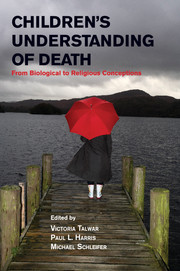Book contents
- Frontmatter
- Contents
- List of Figures and Table
- List of Contributors
- Preface and Acknowledgments
- 1 Death, Ancestors, and the Living Dead: Learning without Teaching in Madagascar
- 2 Death in Spain, Madagascar, and Beyond
- 3 Ambivalent Teaching and Painful Learning: Mastering the Facts of Life (?)
- 4 Death in the Lives of Children
- 5 Talking to Children about Death in Educational Settings
- 6 Responsible Believing
- 7 Thoughts and Feelings: Children and William James Have It Right!
- 8 How the Law Constructs Its Understanding of Death
- Index
- References
1 - Death, Ancestors, and the Living Dead: Learning without Teaching in Madagascar
Published online by Cambridge University Press: 03 May 2011
- Frontmatter
- Contents
- List of Figures and Table
- List of Contributors
- Preface and Acknowledgments
- 1 Death, Ancestors, and the Living Dead: Learning without Teaching in Madagascar
- 2 Death in Spain, Madagascar, and Beyond
- 3 Ambivalent Teaching and Painful Learning: Mastering the Facts of Life (?)
- 4 Death in the Lives of Children
- 5 Talking to Children about Death in Educational Settings
- 6 Responsible Believing
- 7 Thoughts and Feelings: Children and William James Have It Right!
- 8 How the Law Constructs Its Understanding of Death
- Index
- References
Summary
At the time of my last period of fieldwork in Madagascar, Brika was seventeen. I had invited him to my house to participate in the study I was conducting about death and the ancestors (cf. Harris, Chapter 2). As with all other participants, I introduced Brika to the task by telling him that I was going to narrate a short story followed by several questions. I reassured him that these questions did not have “right” or “wrong” answers, because people have different opinions about them. I told him that I just wanted to learn about his own way of thinking.
Brika carefully listened to the story and patiently answered all my questions. Once the formal interview was over, he engaged thoughtfully with a number of additional open-ended questions about the meaning of the word angatse, the reasons for offering food to the ancestors, the significance of dreams, and the existence of people who, having died, come back to life. He explained that when a person dies “the body rots and turns into bones,” but the spirit (known as fanahy when the person is alive and as angatse once the person has died) “continues to be there.”
- Type
- Chapter
- Information
- Children's Understanding of DeathFrom Biological to Religious Conceptions, pp. 1 - 18Publisher: Cambridge University PressPrint publication year: 2011
References
- 10
- Cited by



